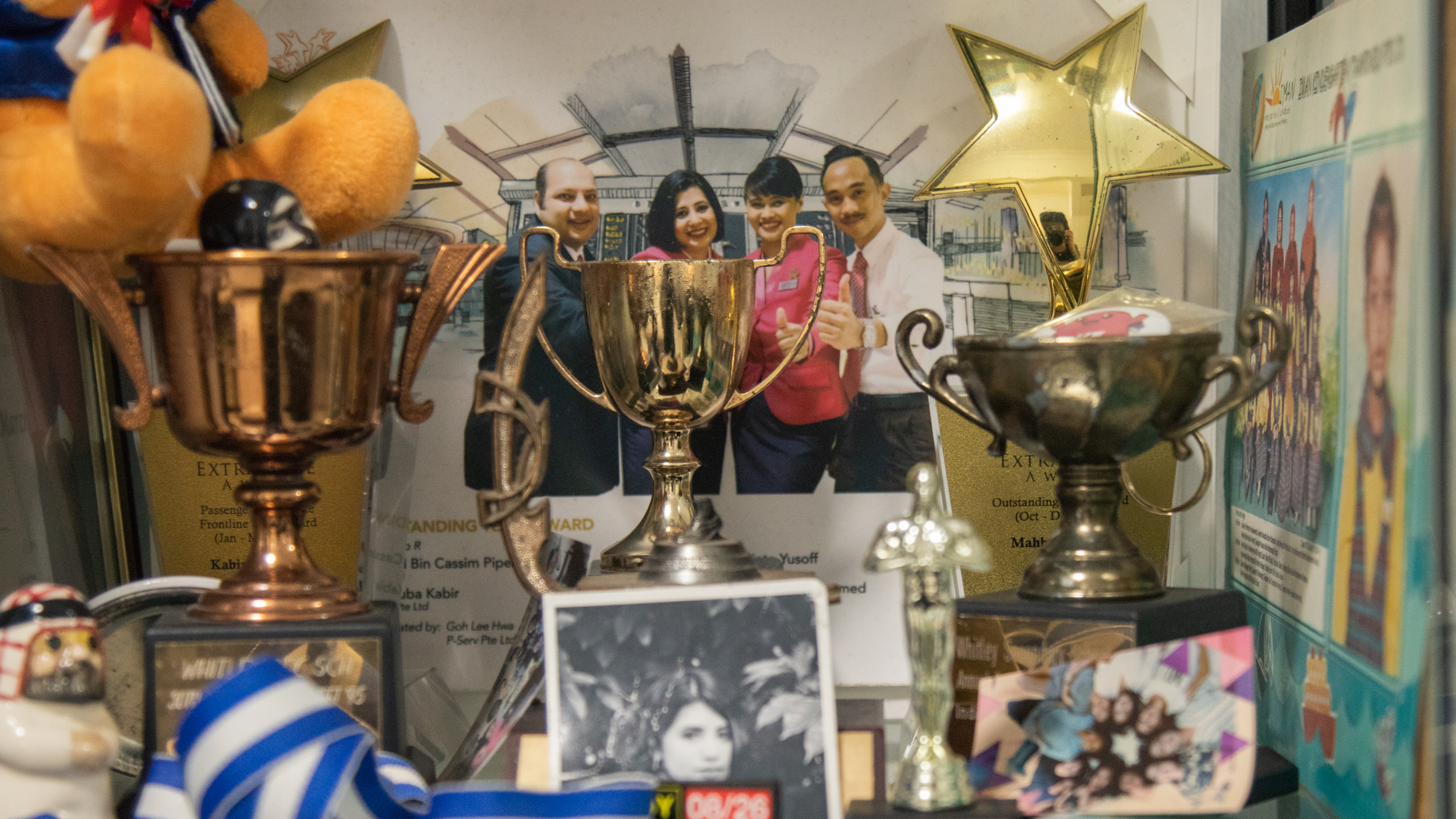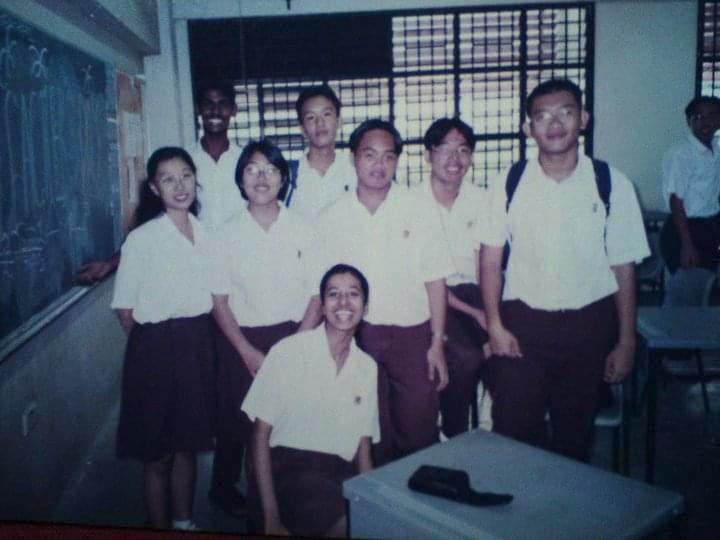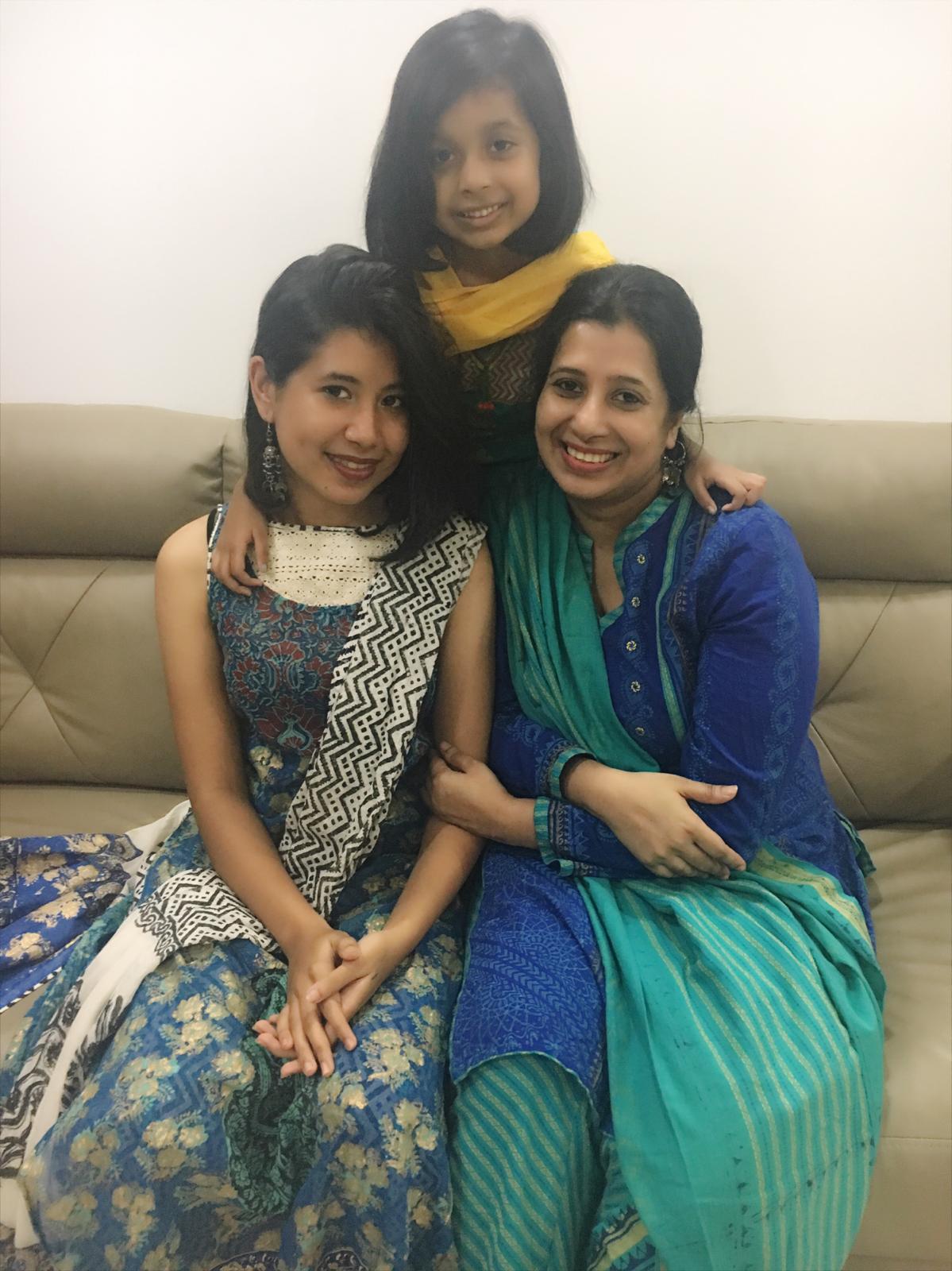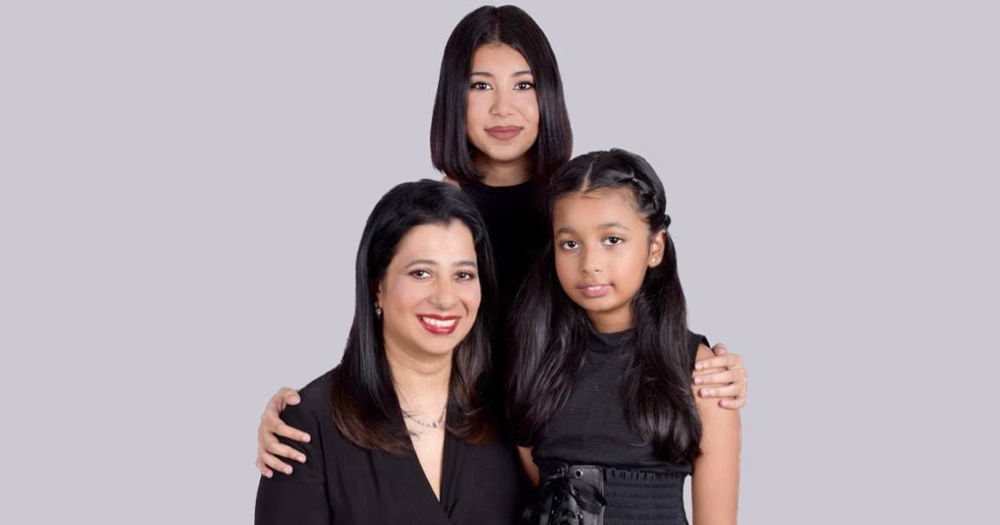Update: As of Jan. 31, 2023, Ramisa is studying at the University of Essex, via Kaplan University in Singapore, where she is sitting for a degree in computer science. Her tuition fees are partially paid for by funds raised by the public, while she covers the remainder. She is due to graduate from her degree programme in July 2023.
For many families in Singapore, the Covid-19 pandemic has wreaked havoc on their plans — both long-term and short.
For immigrants studying and working in Singapore such as Bangladeshi national Ramisa Tabassum, 20, and her 42-year-old mother Mahbuba Kabir, the term upheaval is an understatement.
The pandemic, they told Mothership, has brought about a rapid unravelling of dreams and ambitions, and left the family’s future hanging precariously on a knife’s edge.
Ramisa arrived in Singapore in 2017, excited to start a new phase of her life as a student at Temasek Polytechnic.
“The first thing I saw was this banner,” said Ramisa, recalling her polytechnic application process.
“(It was showing) a fashion show, and I was like: ‘What is this?’ And because I was always into fashion, into barbies and dressing up and everything, I didn’t even think twice.
I was just like, this is my first choice: (a diploma in) Apparel Design and Merchandising.”
That first step toward realising childhood fantasies for Ramisa was also a milestone for her mother Mahbuba — who had moved to Singapore seven years prior, in the hopes of carving out a more promising future for her daughter and herself.
Mother and daughter reunited in Singapore
“In Bangladesh, things were not working out for me as a single mother,” said Mahbuba.
“My biggest fear was for my daughter — I want to give her the best of this life. And I found it quite difficult to establish that life for my daughter.”
Mahbuba had previously lived in Singapore while her father worked here, completing her secondary education in that time.
“She still has trophies from Whitley Secondary,” said Ramisa.
“Why don’t you show him!” she insisted gently.
After more encouragement from her daughter, Mahbuba went over to a glass cabinet in the living room of the Tampines HDB flat where the family rent a room, and pulled out a trophy for the school’s cross country event.
“1992,” she said proudly, with a warm smile.
“Every year I liked to run.”
 Image by Andrew Koay.
Image by Andrew Koay.
 Mahbuba (centre bottom) during her days at Whitley Secondary School. Image courtesy of Mahbuba Kabir.
Mahbuba (centre bottom) during her days at Whitley Secondary School. Image courtesy of Mahbuba Kabir.
Years later as an adult, Mahbuba would reconnect with her secondary school sweetheart from Whitley.
After she moved to Singapore in 2010, the two wed and had a child — Mahbuba’s second daughter 8-year-old Farzana — before eventually divorcing; "it was not working well,” she said.
That turmoil, however, complicated Mahbuba’s plans to bring Ramisa to Singapore — who was 10 at the time, and living with her biological father in the Bangladeshi city of Chittagong.
When Ramisa finished her O-Levels in Bangladesh however, the family saw an opportunity to be reunited.
“I was more excited than nervous,” said Ramisa when I asked how she’d felt then.
“A lot of my friends were shocked when I told them [of the move].
But I’ve always seen my mum move to different places, and she’s always not scared or anything. So I guess I’m the same.”
Finding her footing in Singapore
Adapting to Singapore, Ramisa told me, was easy despite it being “so different”.
In terms of education, Ramisa’s international school — which she attended on a scholarship — had actually been using Singapore version of the O-Level syllabus.
Neither did she have much issue in terms of language. Ramisa told me her slight American-accent was the result of the school enforcing a strict speak-English-only rule while students were on campus.
Ramisa’s bubbly disposition put her in good stead with her peers at Temasek Polytechnic, while she also managed to build good relationships with her lecturers.
Two experiences in her study here are particularly memorable: first, her final year project, where Ramisa designed and built a mock-up of the interior of a fashion retail store.
Second, Ramisa fondly recalled her days as an intern at TV and film production company Ochre Pictures, where she helped manage the wardrobe of "The Last Madame".
The show, Ramisa proudly told me, beat out competition from popular K-drama "Crash Landing On You" to win Best Asian Drama at the Busan International Film Festival.
 Ramisa and Joanne Peh. Image courtesy of Ramisa Tabassum.
Ramisa and Joanne Peh. Image courtesy of Ramisa Tabassum.
Seeing other Bangladeshi nationals in Singapore, who are more often than not migrant workers, also tinted her foreign experience with a shade of familiarity.
"(They’re) my countrymen. Sometimes when I look at them, I just want to give them a big hug.
Whenever I’m in the MRT and if I hear someone speaking in Bengali, it just like lightens up my mood immediately."
So what is the biggest difference for her between living in Singapore and Bangladesh?
“Safety. It’s much safer. I don’t think taking the bus in Bangladesh is a safe option at all. Here I can take a bus at midnight and nothing is going to happen.”
“I know for sure nothing’s gonna happen,” said Ramisa with Mahbuba nodding her head and ahh-ing in agreement.
“But (in Bangladesh), even in broad daylight — even if you’re with your father on the bus — things can happen.”
For Mahbuba, to give her daughter the privilege of a good education in a field she is passionate about, must have been incredibly meaningful.
I watched as the 42-year-old single mother of two smiled contentedly while her eldest talked about life in Singapore.
“Whatever has happened with me — jobless, my marriage — I think we have never sacrificed her study. Never ever,” said Mahbuba.
Struggles in the pandemic
Yet, the family’s growing sense of stability and their hopes for the future were quickly quashed by the Covid-19 pandemic.
Mahbuba, who had been working at Changi Airport Group for nine years, was laid off in May. She subsequently struggled to find a job.
These days, she told me she works in an administrative support role in a recruitment firm, though she draws a lower salary than before.
Having specialised in retail visual merchandising during her diploma studies, Ramisa had hoped that her part-time role as a sales associate for a premium fashion brand would be converted to a full-time one.
However, when the store ended up cutting manpower during the pandemic, Ramisa was let go instead.
Crucially for her, it came at a time when she was due to graduate.
Already an unceremonious occasion given the circumstances, the polytechnic also cancelled this year's faculty’s fashion show — an annual landmark event where each batch of students would showcase their skills and their final year projects.
No longer a student pass holder, and now without full-time employment, Ramisa is staying in Singapore on a long-term visit pass (LTVP), which expires in April 2021.
Her dreams of pursuing a degree here — and therefore qualifying for another student pass — have also been hampered as the family lacks the funds to pay for tuition.
And Ramisa can’t legally find employment with an LTVP, though the family told me they'd received assurances from the Ministry of Manpower that Ramisa will be granted a Letter of Consent to waive that restriction — if she finds a job.
In any case, what’s been a less-than-ideal market for Singaporeans seeking employment is a nightmare situation for foreigners here, with businesses having to meet local employee quotas and navigate other laws regarding the hiring of foreigners.
As things stand, it looks likely that Ramisa will be required to leave Singapore and return to Bangladesh in five months' time.
Though she hasn’t begun to fathom what life would be like there; “I don’t want to imagine it,” she said.
All her friends from school no longer live in Bangladesh and have instead moved overseas to attend university, she told me.
Her father, on the other hand, is completely out of the picture, and no other family exists as support back in her country of origin.
Apart from the aforementioned safety issues, mother and daughter told me that Ramisa would have to deal with stigmatisation from what is still a relatively traditional society.
“There’s going to be a lot of talk. Like this single girl — this 21-year-old single girl — living alone, working at an office filled with men.”
Moving back to Bangladesh with her eldest daughter doesn’t seem to be an option for Mahbuba, as her youngest daughter is a Singapore Citizen, and would benefit from the education system and environment here.
 (L-R) Ramisa, her sister Farzana, and Mahbuba. Photo courtesy of Mahbuba Kabir.
(L-R) Ramisa, her sister Farzana, and Mahbuba. Photo courtesy of Mahbuba Kabir.
"I will try until the last day"
A lot of the family’s aspirations now rest on a fundraising campaign with local fundraising platform Ray of Hope, that Mahbuba started in the hopes of raising the tuition fees that Ramisa needs to sit for a degree course.
Ramisa has qualified for a Bachelor of Arts in Communication and Media Studies and Journalism at Kaplan with Murdoch University, and the total cost excluding books and other fees is S$31,779.
“The true feeling would be embarrassment,” said Ramisa when I asked her about the campaign.
“I’m quite independent and a little bit egoistic. So you know, when you want to ask for money, it’s kind of a big deal to me. And this is a lot of money.”
As I spoke to Ramisa, who turns 21 this weekend, the stress of the situation, seemed to be getting to her.
“(Right now) I have one foot in Singapore, and the other is just hanging. I don’t know where I’m going to land.”
“My thinking is at least we tried,” said Mahbuba on the campaign.
“I don’t want to sit down and say that I didn’t try. Even though on her last day, she needs to depart and go back to Bangladesh, I will try until the last day.”
Keeping her daughter in Singapore would not only mean keeping the family together.
It would also go some way to fulfilling the mother’s promise to give her Ramisa the “best of this life”.
Education, she had determined, would be the crucial piece in accomplishing that mission.
Her thinking, no doubt, is that the struggle and worries of today would pay off if she could just get her daughter through university and ensure her a good shot at success.
“When I first entered that room,” said Mahbuba pointing to her bedroom, “That wall was supposed to be our family picture from Ramisa’s graduation.”
“It’s still empty so I’m not giving up.”
If you would like to contribute to or learn more about Ramisa's fundraising campaign you can do so here.
Stories of Us is a series about ordinary people in Singapore and the unique ways they’re living their lives. Be it breaking away from conventions, pursuing an atypical passion, or the struggles they are facing, these stories remind us both of our individual uniqueness and our collective humanity.
Top courtesy of Ramisa Tabassum
If you like what you read, follow us on Facebook, Instagram, Twitter and Telegram to get the latest updates.
